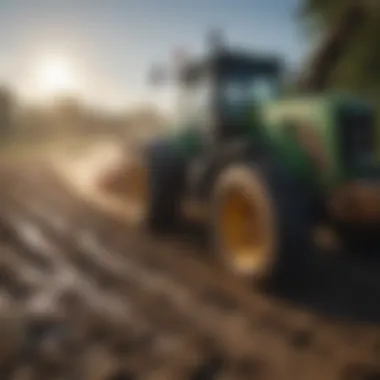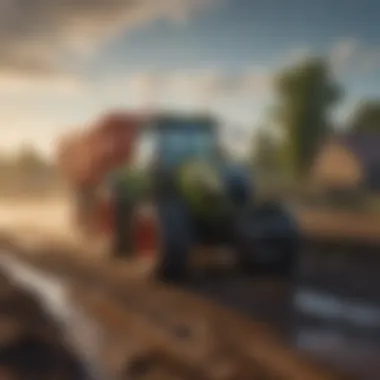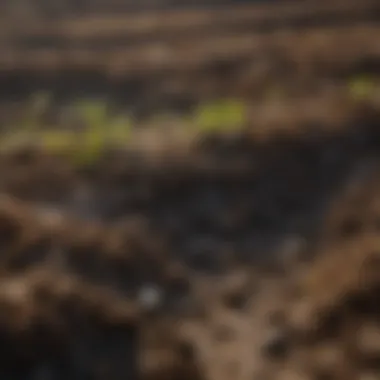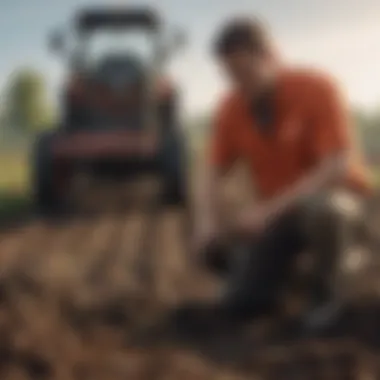The Muckmaster's Role in Sustainable Agriculture


Intro
The agricultural landscape is undergoing significant changes, driven by the need for sustainability and efficiency. In this context, the role of muckmasters emerges as pivotal. Muckmasters are specialized professionals responsible for managing organic waste and muck. Their work influences soil health, waste management, and crop productivity. Understanding this role is crucial for modern farming practices that aim to balance productivity with ecological responsibility.
Current Trends in Agriculture and Horticulture
Overview of Recent Innovations
Innovation in agriculture is not limited to technology; it includes practices that enhance sustainability. One notable trend is the adaptation of regenerative farming techniques. Muckmasters contribute to these practices by utilizing organic waste to improve soil structure and fertility. This approach has gained traction, promoting biodiversity and reducing reliance on chemical fertilizers.
Sustainable Practices Gaining Popularity
Sustainable farming practices are essential for future food security. Muck management, led by muckmasters, plays an integral part in this shift. By processing muck into valuable compost, they provide farmers with natural fertilizers that enrich soil life. Practices like cover cropping and crop rotation are often supported through effective muck management, enhancing overall farm resilience.
Essential Farming Techniques
Soil Health Management
Soil health is the foundation of productive agriculture. Muckmasters focus on integrating organic matter from muck back into the soil. This not only enhances nutrient availability but also improves soil texture and moisture retention. Techniques such as incorporating compost into the soil and practicing no-till farming can significantly boost soil vitality and microbial diversity.
Pest and Disease Control Strategies
Effective muck management can also mitigate pest and disease problems. By maintaining healthy soil, muckmasters help create an ecosystem where beneficial organisms thrive. Crop rotation and mulching, encouraged by muck application, can significantly reduce pest infestations. Such strategies underline the interconnectedness of soil management and pest control in sustainable farming systems.
Tools and Technology in Farming
Overview of Advanced Farming Tools
The introduction of technology has transformed muck management practices. Tools like compost turners and manure spreaders are essential for muckmasters. Recent innovations, such as precision agriculture devices, also allow for more efficient muck application, ensuring nutrients reach crops effectively without over-application.
Case Studies on the Use of Technology
For instance, using drones to map muck application areas aids in precision. One case study from a farm in Oregon demonstrated a marked increase in crop yields after implementing drone technology for muck application. Such advancements remain critical in advancing muck management practices in modern agriculture.
Muckmasters play a crucial role in linking traditional farming knowledge with modern agricultural practices, ensuring sustainability and productivity in the face of growing global challenges.
The exploration of muckmasters' role in today’s agriculture reveals their importance in enhancing soil quality and promoting ecological balance. The challenges they face, including environmental regulations and technological changes, underscore the demand for skilled muckmasters in the agricultural sector. Their expertise will shape sustainable farming practices for generations to come.
Prelims to Muckmaster
Muckmasters play a vital role in modern agriculture by bridging the gap between effective waste management and sustainable farming practices. This introduction outlines the significance of muckmasters and their practices in today's agricultural landscape. They ensure that the benefits of muck, a mixture of organic waste and soil, are maximized while mitigating any potential environmental hazards associated with improper handling.
The muckmaster is not just a title but encompasses a range of duties that directly influence soil health and crop productivity. Farmers and agricultural enthusiasts must understand this role as it embodies the blend of tradition and modernity within agricultural practices. Insights into muck management techniques reveal how muckmasters can enhance soil quality and promote efficient waste management.
Definition and Origin
The term "muckmaster" refers to an individual who specializes in the management and application of muck to agricultural land. The origin of the word stems from traditional agricultural practices where organic matter, such as animal waste, was recognized for its beneficial properties on soil health. Over time, the role of a muckmaster has evolved into a more formal and specialized position, as sustainability has become increasingly crucial in agriculture.
Muck itself is often defined as decomposed organic matter that enriches soil with nutrients. This organic material can include everything from livestock manure to compost, all of which are essential to enhancing the soil's fertility. The understanding of muck and its positive effects dates back centuries, but the professionalization of muck management is a product of contemporary agricultural needs.
Historical Background
Historically, muck management in agriculture guided how farmers treated waste. In earlier times, muck was simply discarded or allowed to decompose naturally. As farming evolved, so did the understanding of organic waste's potential to enhance soil quality. The industrialization of agriculture introduced new techniques for waste disposal that often overlooked the benefits muck could provide.
In the late 20th century, a shift towards sustainability prompted the re-evaluation of muck's role in agriculture. This led to the establishment of the muckmaster's position. Muckmasters began to integrate modern methods with age-old practices, focusing on the comprehensive use of muck. They became champions for efficient muck application while maintaining environmental standards, which now are essential to farming's future.
The Importance of Muck in Agriculture
Muck plays an essential role in modern agriculture, particularly regarding sustainable practices. Its multifaceted benefits extend from improving soil conditions to enhancing crop yields. Recognizing the value of muck allows farmers to leverage it effectively, leading to a more productive and environmentally friendly agricultural system.


Nutritional Value of Muck
Muck serves as an important source of nutrients that are vital for plant growth. It is rich in organic matter, which contributes to the fertility of the soil. The breakdown of muck releases nitrogen, phosphorus, and potassium—all essential for healthy plant development. Additionally, muck enhances the availability of trace elements such as zinc and copper. These nutrients not only support crop growth but also improve the overall health of the ecosystem.
Muck’s nutritional profile can vary based on its source, so understanding where it comes from is important. For instance, muck derived from animal manure often contains higher nitrogen levels, while vegetable waste might provide more phosphorus. Farmers should conduct soil tests to determine the specific nutritional needs of their crops, enabling them to apply muck in a tailored manner.
Key benefits of muck's nutritional value include:
- Enhanced soil fertility leading to improved crop yields.
- Better nutrient retention due to increased organic content.
- Reduction in the necessity for synthetic fertilizers, which can harm soil health in the long term.
Impact on Soil Health
The impact of muck on soil health is profound and integral to sustainable agriculture. Muck improves soil structure, enhancing aeration and drainage. This is crucial for root development and moisture retention—two factors that significantly affect crop productivity.
Furthermore, muck introduces beneficial microorganisms into the soil. These microorganisms play pivotal roles in breaking down organic matter and converting it into forms accessible to plants. A thriving microbial community leads to improved soil resilience against pests and diseases, further promoting healthy crop growth.
"The addition of muck to agricultural practices not only boosts productivity but also fosters long-term soil health."
Moreover, muck can help mitigate soil erosion. By improving soil structure and promoting vegetation growth, muck assists in stabilizing the soil. This is especially vital in regions prone to erosion due to heavy rains.
In summary, muck is not just waste; it holds intrinsic value in enhancing soil health and productivity. Recognizing and utilizing this resource effectively is instrumental for farmers committed to sustainable practices.
By integrating muck management into their operations, agricultural stakeholders can significantly contribute to the nurturing of the land.
Roles and Responsibilities of a Muckmaster
The role of a muckmaster is pivotal in modern agriculture, especially in terms of enhancing soil quality and promoting sustainable practices. Muckmasters manage the muck primarily from livestock and organic waste, ensuring that it serves as a beneficial resource rather than a pollutant. Adopting effective muck management strategies offers several advantages, such as improving crop yields and maintaining ecological balance.
Soil Management Techniques
Muckmasters utilize various soil management techniques to optimize the benefits of muck. These techniques are vital for enhancing soil fertility and structure. One common approach is adding muck directly to the soil. This practice enriches the soil with essential nutrients, fostering healthier crop growth. Proper application rates and timing are crucial to avoid nutrient runoff, which may detrimentally affect water bodies.
- Composting: Muck can be mixed with other organic materials to create compost. This process converts waste into a valuable soil amendment, which retains moisture and nutrients. The end product not only enhances soil health but also promotes a balanced microbial ecosystem within the soil.
- Cover Cropping: Muckmasters often recommend using cover crops between main planting cycles. These crops, when mixed with muck, can improve the soil structure and prevent erosion, ensuring sustainable agricultural practices.
- Soil Testing: Regular soil testing is another responsibility. This allows muckmasters to analyze nutrient levels and pH balance, helping pinpoint the specific needs for muck application. Understanding the precise requirements enhances the effectiveness of muck usage and minimizes waste.
The integration of these techniques reflects the broader purpose of muck management to enhance productivity and sustainability in farming.
Waste Management Practices
In addition to managing muck, muckmasters play an essential role in waste management. Effective waste management practices help minimize the environmental impact of farming activities. Muckmasters must ensure that muck is handled in a manner that meets regulatory standards while being beneficial to agricultural processes.
- Collection Systems: Implementing efficient muck collection systems is crucial. This includes using specialized equipment to gather muck from livestock facilities without compromising hygiene or safety. Appropriate collection methods reduce labor costs and improve efficiency.
- Storage Solutions: Proper storage is necessary to prevent nutrient loss and odor issues. Muckmasters should utilize airtight storage facilities that keep the muck in optimal condition for later use.
"Effective muck management is not just a practice, it’s a commitment to sustainable future."
- Treatment and Processing: In some cases, employing treatment strategies can be beneficial. This may involve anaerobic digestion or mechanical separation processes. These methods can convert muck into usable biogas, providing a renewable energy source while reducing waste.
This careful approach to waste management reinforces the muckmaster's role as a key figure in agriculture. Their tasks ensure the responsible use of resources and contribute to environmental sustainability. The responsibilities of muckmasters extend beyond the farm, impacting community health and regulatory compliance.
Muck Management Techniques
Muck management is a critical aspect of modern agriculture, as it directly affects soil health, crop yields, and overall farm sustainability. Effective muck management techniques help optimize the use of organic matter, converting waste into valuable resources for improved agricultural practices. These techniques can be broken down into three primary areas: collection methods, storage solutions, and application techniques. Each area plays an essential role in the muckmaster's responsibilities and contributes to the larger goals of sustainable farming.
Collection Methods
The first step in muck management is effective collection methods. These methods determine how muck is gathered from various sources, such as livestock facilities, crop fields, or compost areas. Various techniques exist, each with its benefits and considerations.
- Manual Collection: While labor-intensive, manual collection allows for a more thorough assessment of muck quality. Workers can identify suitable materials for composting.
- Mechanical Collection: Equipment like front-end loaders and muck spreaders automate the process. This approach increases efficiency and reduces the time required for muck handling.
- Vacuum Systems: These systems are effective for large-scale operations. They can quickly remove muck while minimizing the mess typically associated with traditional methods. However, the initial investment can be high.
Selecting an appropriate collection method depends on farm size, muck volume, and available resources. Proper collection lays the foundation for successful muck management.


Storage Solutions
Once collected, muck needs to be stored properly to maintain its quality until it can be applied to fields. The choice of storage solution impacts the nutrient content and decomposition process, crucial for maximizing effectiveness when used as fertilizer. Important storage options include:
- Composting Bins: Enclosed composting bins provide a controlled environment for decomposition. They help enhance the nutrient profile of the muck, making it a more effective fertilizer.
- Pits and Lagoons: These are common for larger farms. They hold muck until it can be applied but must be managed carefully to prevent odor and nutrient runoff. Proper aeration and monitoring of muck can prevent leaching.
- Covered Piles: Storing muck in covered piles can protect it from rainfall, reducing nutrient loss. Using tarps or other covers helps maintain the nutrients and minimizes odors.
The right storage solution helps preserve muck quality, ensuring that it remains beneficial when it is time for application.
Application Techniques
Applying muck to fields is the final step in muck management, where its benefits are realized. However, proper application techniques are crucial to ensure that nutrients are effectively utilized by crops. Common techniques include:
- Broadcast Spreading: This is a straightforward method where muck is spread evenly across the field surface. It works well for large areas but may lead to uneven nutrient distribution.
- Injecting: Muck can be injected directly into the soil, reducing odor and nutrient loss. This technique ensures that nutrients are immediately available to plant roots.
- Surface Application: This involves spreading muck on the surface and allowing it to decompose naturally. It's less labor-intensive but requires careful timing to align with crop growth cycles.
Choosing the right application technique depends on crop type, soil conditions, and the desired nutrient release. Proper techniques enhance the benefits of muck, contributing to soil health and improved crop productivity.
Proper muck management techniques foster a sustainable agricultural ecosystem, maintaining soil vitality and supporting higher crop yields.
In summary, muck management techniques encompass collection methods, storage solutions, and application strategies. Each component plays a vital role in ensuring that muck is efficiently transformed from waste to a resource that bolsters agriculture's sustainability.
Technological Advancements in Muck Management
In the contemporary landscape of agriculture, technological advancements in muck management are becoming increasingly crucial. These innovations help address inefficiencies and augment sustainability in farming practices. This section explores the current developments and their implications for muckmanagement.
Emerging Technologies
Emerging technologies in muck management include various tools and methodologies that enhance the efficiency of muck handling. The integration of data analytics and sensor technology allows for precise monitoring of muck conditions. For example, sensors can measure moisture content, temperature, and nutrient levels in real-time. This data aids muckmasters in making decisions that maximize soil enrichment while minimizing environmental impact.
Benefits of Emerging Technologies:
- Increased Efficiency: Automating tasks related to muck management can significantly reduce labor costs and errors.
- Enhanced Monitoring: Real-time data facilitates timely adjustments, ensuring effective muck application.
- Sustainable Practices: Technology aids in optimizing the use of muck, which can lead to better soil health and reduced fertilizer dependency.
Moreover, there are advancements in biotechnology, such as microbial inoculants that improve the breakdown of organic matter in muck. This process not only enriches the soil but also reduces greenhouse gas emissions from traditional muck management practices.
"Innovation in muck management is not just an addition to agriculture; it is a critical element that reshapes the landscape towards sustainability."
Automation in Muck Handling
The automation of muck handling has revolutionized the roles and responsibilities of muckmasters. Machinery and software solutions now assist in the collection, storage, and application of muck. These systems minimize manual labor and enhance precision in muck application.
Automation Benefits:
- Time-Saving: Machines can perform tasks more quickly than human laborers, leading to rapid muck processing.
- Consistent Quality: Automated systems ensure uniform application, which is crucial for maximizing soil benefits.
- Safety Improvements: Reduced human involvement decreases the potential for accidents in muck handling practices.
Examples of automated equipment include muck spreaders equipped with GPS technology, which allow for precision application across fields. This minimizes both waste and environmental impact while providing farmers with data to track muck application effectiveness.
In summary, the advancements in muck management technology, from sensors to automation, signify a transformative shift towards more efficient and sustainable agricultural practices. These innovations not only enhance productivity but are also essential for addressing global food security while caring for the environment.
Environmental Considerations
The principles of environmental considerations are crucial in the role of muckmasters within agriculture. These professionals not only focus on enhancing productivity but also on ensuring farming practices remain sustainable. The process of muck management involves more than just efficient handling; it requires a commitment to ecological integrity and preservation of natural resources.
Sustainable muck practices contribute positively to the environment, helping to minimize the impact of agricultural activities on soil and water systems. The use of organic muck enhances soil quality, promoting biodiversity, and improving water retention. This practice effectively supports sustainable farming that can withstand economic pressures while also benefiting the environment.
Sustainability Practices
Adopting sustainability practices is essential for muckmasters. These practices not only benefit the land but also align with growing consumer demand for responsibly sourced products. Muckmasters can implement several strategies:
- Composting: Muck can be utilized to create compost, which enriches soil and reduces waste.
- Crop Rotation: Some muckmasters apply muck to different types of crops sequentially to enhance soil fertility and minimize nutrient depletion.
- Cover Cropping: This technique prevents soil erosion and enhances soil structure, fostering a healthier ecosystem.


These practices demonstrate a shift towards more responsible farming that recognizes the interconnectedness of agricultural health and environmental health. Such strategies help maintain robust ecosystems, ensuring that crop production is not only productive but also sustainable over the long term.
Regulations Affecting Muck Management
The framework of regulations governing muck management is vital. These regulations are designed to protect water quality and promote sustainable farming methods. Compliance with regulations also ensures that muckmasters can operate without facing legal challenges.
Several regulations influence muck management:
- Nutrient Management Plans (NMP): These plans help to manage nutrient runoff, essential for protecting water sources.
- State and Federal Laws: Various laws guide the application and storage of muck, ensuring they do not contribute to pollution.
- Environmental Impact Assessments (EIA): An EIA ensures that agricultural practices do not harm local ecosystems.
Adhering to these regulations is not just about compliance; it reflects a farmer's commitment to responsible stewardship of the land. Muckmasters play an integral role in navigating these requirements, helping to bridge the gap between agricultural practices and environmental protection.
Challenges Faced by Muckmasters
In contemporary agriculture, muckmasters encounter a variety of challenges. Understanding these challenges is vital. It helps stakeholders to appreciate their role and emphasizes the need for effective strategies to address these obstacles. Muckmasters are positioned at the intersection of agricultural productivity and the environment. They must navigate complex dynamics to enhance soil health while ensuring sustainable farming practices.
Adaptation to Climate Change
Climate change poses significant challenges for muckmasters. Shifting weather patterns affect crop yields and soil moisture levels. Muckmasters must adapt their strategies to these changes. For instance, they may need to modify muck application rates based on seasonal precipitation. This requires constant monitoring of weather data and soil conditions. Moreover, they may need to implement more resilient soil management practices. These practices can include cover cropping and crop rotation. This adaptability is essential not only for immediate agricultural success but also for long-term sustainability.
Balancing Productivity and Environmental Impact
Muckmasters face a delicate balancing act. On one hand, they strive to maximize agricultural productivity through effective muck management. On the other, they must minimize negative environmental impacts. Over-application of muck can lead to nutrient runoff and soil degradation. Therefore, muckmasters must employ precise application techniques. They need to assess crop nutrient needs accurately. This involves regular soil testing and using data analytics to optimize muck usage. Finding this balance is crucial for maintaining soil health and ensuring the long-term viability of farming operations. Sustainable practices help mitigate environmental risks while supporting productive agriculture.
Future of Muck Management
The consideration of the future of muck management carries significant implications for sustainable agriculture. Modern farming faces numerous challenges related to soil health, waste management, and environmental impact. Understanding how muck management will evolve is essential for improving farming practices and promoting ecological balance. Moreover, advancements in this area can enhance crop productivity while addressing global food security issues.
As the agricultural sector shifts towards more sustainable approaches, muckmasters play a crucial role. Their unique expertise in muck handling, waste integration, and soil enhancement contributes to an overall sustainable ecosystem.
Research and Development Needs
Renewed focus on research and development is key to advancing muck management practices. Here are some specific areas that require attention:
- Innovative Waste Conversion Techniques: Research into methods that convert muck into valuable resources, like bioenergy or organic fertilizers, can optimize waste utilization.
- Soil Health Monitoring Technologies: Development of real-time monitoring systems can help muckmasters assess soil condition more effectively.
- Collaboration with Agricultural Scientists: Partnerships with researchers in soil science can lead to better understanding of muck dynamics and its effects on plant growth.
- Training and Education Programs: Comprehensive educational initiatives for muckmasters will enhance their skills and knowledge, leading to better muck management outcomes.
Furthermore, investment in these areas fosters technological advancements and promotes more efficient muck handling processes, ultimately benefitting agricultural communities and ecosystems.
Predicted Trends in Agriculture
Several trends are anticipated as muck management progresses in modern agriculture:
- Increased Automation: The use of robotics and automated systems for muck collection and processing will likely expand, improving precision and efficiency in muck management.
- Data-Driven Decision Making: Farmers will increasingly rely on data analytics to inform muck application strategies, enhancing productivity and sustainability.
- Eco-Friendly Practices: As sustainability becomes more central, there will be a shift towards organic and environmentally friendly muck handling practices.
- Regenerative Agriculture Practices: Principles of regenerative agriculture may become more prevalent, emphasizing soil health and biodiversity through improved muck management techniques.
"The future of muck management will be determined by our capacity to innovate and adapt to changing agricultural landscapes."
While navigating these trends, muckmasters will need to remain adaptable to shifting regulations and market demands. The intersection of technology and sustainable practices will define the next chapter in muck management, reinforcing its importance in fostering healthy and productive agricultural systems.
Ending
The conclusion serves as a pivotal component in this discussion, summarizing the key insights gleaned from the previous sections about muckmasters and their significant roles within modern agriculture. A thorough understanding of the muckmaster's functions is essential for appreciating their contributions to both sustainable practices and soil health.
Summation of Key Points
Muckmasters are integral to effective muck management, playing a multifaceted role in agriculture that includes:
- Soil enhancement: By improving soil quality, muckmasters contribute significantly to crop productivity.
- Nutrient cycling: They ensure efficient waste utilization, thereby enhancing the nutrient profile of agricultural lands.
- Sustainability: Their practices support environmental conservation, reducing the agricultural carbon footprint.
- Adaptation strategies: Muckmasters are key in addressing modern challenges such as climate change and regulatory pressures aimed at creating more sustainable agricultural practices.
These points illustrate how muckmasters not only manage muck but also serve as a bridge between traditional farming and modern sustainable practices.
Call to Action for Stakeholders
For stakeholders in agriculture, engaging with the muckmaster role is imperative. Collaborating with muckmasters can lead to the implementation of best practices in muck management which promotes:
- Enhanced soil health through targeted applications of muck.
- Reduced waste production with innovative storage and application techniques.
- Improved crop yields through better nutrient management.
By investing in education and resources for muckmasters, the agricultural community can elevate its commitment to sustainability. It is crucial for farmers, agronomists, and policy-makers to recognize the value of muck management and to support the muckmasters in their vital work. This collective effort can ensure a more productive, sustainable, and environmentally friendly agricultural future.



